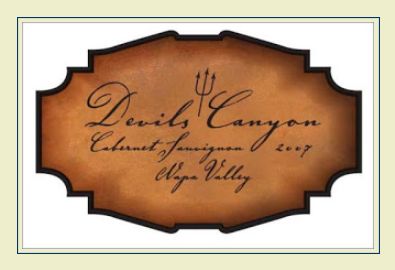The Board denied petitioner's claims of abandonment and fraud aimed at a registration for the mark DEVIL'S CANYON VINEYARD for wine. Petitioner Brew4U claimed that Respondent Icon Design never sold any wine under the mark and did not obtain a COLA certificate from the Alcohol and Tobacco Tax and Trade Bureau (TTB). Respondent asserted that it used the trademark for bottles of wine shipped to its customers to promote its brand development business. Brew 4U, LLC v. Icon Design Group, Cancellation No. 92067639 (May 18, 2020) [not precedential] (Opinion by Judge Linda A. Kuczma).

Respondent Icon Design, based in Napa, California, provides label and packaging design and other brand creation services to clients in the wine industry. It is not a winery or a seller or re-seller of wine, since it does not manufacture, produce or distribute wine. However it "has wine produced and bottled that is given to others to promote [its] business."
Petitioner Brew 4U is a craft brewery in the San Francisco Bay area that has used the mark DEVIL'S CANYON BREWING COMPANY since 2001 in connection with beer. Its application to register the mark was blocked by respondent's registration. Since that registration was more than five years old, the grounds on which it could be canceled were limited by Section 14 of the Lanham Act. Petitioner relied on two available claims: abandonment and fraud.
Abandonment: Evidence of nonuse of a mark for three consecutive years constitutes a prima facie showing of abandonment. See Section 45. Respondent admitted that it has never made or sold wine, does not operate a winery, has no license in connection with its goods, and has no COLA registration corresponding to its mark that would support the sale of wine in interstate commerce under 27 USC Section 203(a). Therefore, Brew4U contended, respondent abandoned the mark because there was no evidence of any bona fide use of the mark for wine.
However, respondent "has wine produced and bottled that is given to others to promote [its] business," the wine being labeled with respondent's mark. In its discovery responses (which petitioner submitted into evidence) respondent provided the names of nine individuals to whom it has delivered wine within the past three years. It stated that it "currently" delivers its wine "direct to consumer delivery." There was limited documentary evidence to support respondent's discovery responses, but the documents were consistent with the responses.
Petitioner Brew4U maintained that this activity was insufficient to confer trademark rights in connection with wine because it was not the type of commercial use that is typical in the wine industry and does not rise to bona fide trademark use for wine, citing the Board's decision in Tao Licensing, LLC v. Bender Consulting Ltd., 125 USPQ2d 1043 (TTAB 2017), and its non-precedential decision in Modern House Wines LLC v. Hidden Wineries Inc., 2017 WL 3718268, 2017 TTAB LEXIS 290 (TTAB 2017), as instructive on this point.
The Board, however, distinguished those two cases. In Tao Licensing the Board ruled that the distribution of samples of vodka did not confer trademark rights because the evidence showed that the respondent was not "using or even ready to use the mark in the ordinary course of trade," especially since there were no sales in the following two years. In Modern House Wine, there were no sales and no other evidence supporting use of the mark.
This case differs from Tao Licensing and Modern House Wine which were based on the respondents' failure to use their marks in connection with the sale of goods. Here, the evidence supports Respondent's use of its mark on wine distributed as a promotional item in connection with its brand development and package design services. Petitioner has not established that such use is not in the ordinary course of trade.
The Board observed that "a party need not be a manufacturer of goods in order to own and register a trademark."
"[A]any person in the normal channels of distribution including a manufacturer, a contract purchaser who has the goods manufactured for him, and a retailer or merchant ... can be the owner of a trademark "in commerce" if he applies or has someone in his behalf apply his own trademark to goods to which he has acquired ownership and title and sells or merely transports such goods in commerce as his own product with the mark, as applied thereto, serving to identify the particular product as emanating from the shipper or seller in his own capacity." In re Expo '74, 189 USPQ 48 (1975).
Promotional gifts, such as respondent's bottles of wine bearing its mark, may qualify as "transportation" under the definition of "use in commerce" in the Lanham Act. "In other words, a for-profit sale of goods is not required for a statutory use of a mark in commerce. See Capital Speakers Inc. v. Capital Speakers Club of Washington D.C. Inc., 41 USPQ2d 1030, 1034 n.3 (TTAB 1996)."
Petitioner's evidence failed to establish abandonment, but instead showed that Respondent has used its mark and not abandoned it.
Fraud: Petitioner's fraud claim was based on the assertion that Icon Design knew it was not selling or manufacturing wine when it filed its Statement of Use and when it filed its Section 8 Declaration. However, petitioner failed to provide sufficient evidence to show that Icon Design made any false representation regarding use. Moreover, there was no evidence of an intention to deceive the USPTO.
Therefore the fraud claim was quickly denied.
TTABlogger comment: Under Section 45, "use in commerce" requires that "the goods are sold or transported in commerce." Note the "or."
BTW, the Board ruled in Stawski v. Lawson that the interestate shipment of wine without a COLA approval was unlawful and therefore not "use in commerce." TTABlogged here.
PS: See Wine Law Expert Paul Reidl's comment on whether COLA approval was required.
The content of this article is intended to provide a general guide to the subject matter. Specialist advice should be sought about your specific circumstances.
